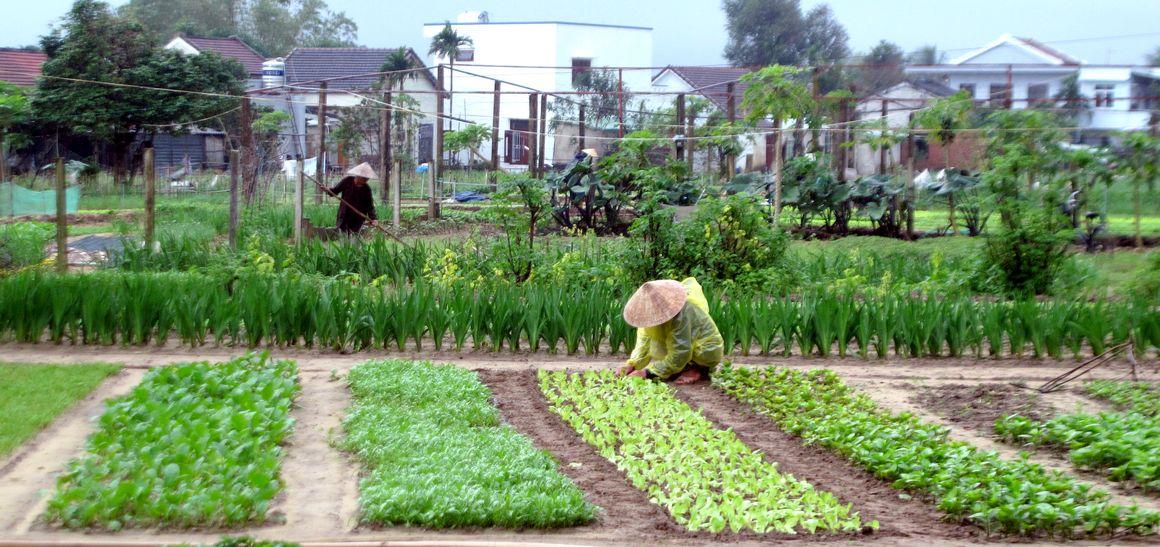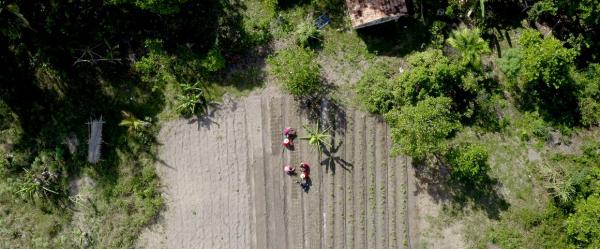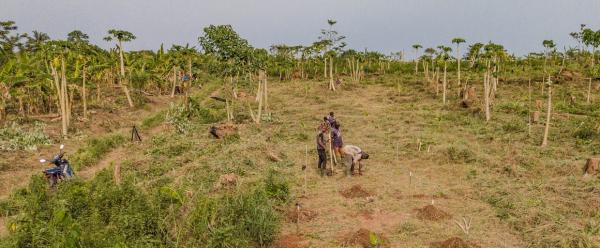Call to action 10 April 2024
- Home
- CIRAD news
- News
- Family farming to renovate food systems
Supporting family farming to remedy the failings of the global food system

Women farmers in Vietnam © V. Bonneaud, CIRAD
To put family farming at the core of national policies and investments, the United Nations decided on a Decade of Family Farming, 2019-2028. This provided the framework for the Global Conference on Family Farming and Food Systems, organized from 23 to 26 November by the World Rural Forum, with financial support from the European Union and the participation of CIRAD.
Family farming is key to transitions
Despite frequent predictions that family farms were likely to die out and be replaced by large industrial farms, family farming is still a huge phenomenon. Some 1.3 billion people work on such farms, which are the world's leading employer.
The fact that family farming is predominant, plus its flexibility and compatibility with alternative production methods, mean that family farms are key to reducing inequality and making our food systems more sustainable.
Family farmers now need sustainable production methods and livelihoods. This topic was covered by the conference's first panel, led by Jean-Michel Sourisseau, a socioeconomist at CIRAD specializing in family farming issues. Ahead of the conference, a group of experts* recommended seven priority actions. Their proposals were discussed by family farmers, donors and partners at the session on 23 November.
Seven priority actions to support family farming
1 - Looking beyond a strict vision of farms
The aim is to focus not just on family farms in the strict sense of the term, but on aspects such as their anchorage within territories and their impact (positive or negative) on natural resources and social relationships.
2 - Improving and securing access to productive resources
Land tenure is a crucial topic that was covered in a session at the Global Conference on Family Farming, with Ward Anseeuw, a researcher with CIRAD and the International Land Coalition. However, family farms also require other resources: water, technology, and services such as credit and insurance.
3 - Valuing local knowledge
Valuing local knowledge is vital, but it is not enough. That knowledge must be mixed with other types, such as academic knowledge, to share it on various scales. For example, agroecology does not only aim to "rediscover" traditional skills in order to make better use of natural processes within production methods. It is obviously important to value local knowledge, but family agroecology can benefit from research, which supplements and objectivizes that knowledge.
4 - Guaranteeing jobs for young people
The question of the next generation applies to every country. It is important to study young people's career pathways in order to come up with a global solution for them. Working conditions for those involved in farming must also be supervised, to create decent, attractive jobs.
5 - Promoting and valuing quality production
Inclusive, sustainable practices, such as agroecology, can help family farms boost the quality and sustainability of what they produce, while reducing their dependence on external inputs. Certification-type mechanisms are a way in which markets can recognize that quality and the environmental and social services rendered.
6 - Strengthening organizations representing and defending family farming
Farmers' organizations play a key role in promoting and defending family farming. They are working to help the sector move on from the vulnerable situation in which the majority of family farmers worldwide find themselves.
7 - Investing massively in family farming
Public policy must reduce exposure and vulnerability to extreme events relating to climate change or other social and environmental risks.
For Étienne Colette, policy officer at the European Commission (DG INTPA), "these seven priorities for action highlight the position of family farming at the crossroads between a range of issues and in relation to various situations and players. And this is the focus for our support of territory-based, farm to fork strategies".
For convergence of family farming and agroecology
Agroecology was ever-present in the debate. As Jean-Michel Sourisseau says, "the principles of family farming are in tune with those of agroecology. We need to help them converge, for their mutual benefit".
He also stresses "the need to come back to the concept of family, to its values in terms of transfers and solidarity, and to the relationship between production, land and family. Policymakers must be able to grasp these concepts".
Lastly, Jean-Michel Sourisseau reminds us that it is important not to forget the antagonisms that exist: "there is also a real ideological debate with those who are against family farming and agroecology, who are working to influence the global arena, national public policy and more generally how value chains are organized".
Farm sizes vary significantly worldwide. "Small farms in Brazil bear no relation to farms in Vietnam or India that would also be classed as small", Jean-Michel Sourisseau points out. A family farm is one on which only family members work. The relationship between the workers is not salary-based but domestic.
* The panel comprised experts from several organizations: the World Rural Forum, the Inades-Formation pan-African network, the International Federation of Organic Agriculture Movements (IFOAM), the Programa de dialogo regional rural (PDRR), the Eastern and Southern Africa Small Scale Farmers’ Forum (ESAFF) and CIRAD.


























